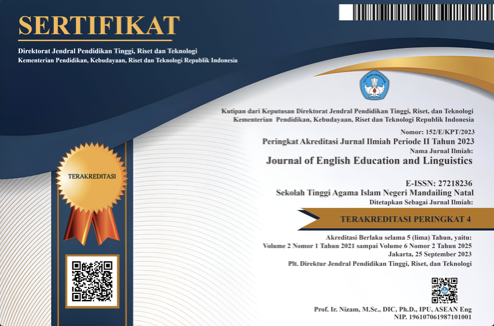THE ANALYSIS OF EFL COLLEGE STUDENTS PERSPECTIVE ON ONLINE LANGUAGE LEARNING DURING COVID-19 PANDEMIC
DOI:
https://doi.org/10.56874/jeel.v2i1.391Keywords:
Covid-19 Pandemic, Languange Learning, Online Learning, Students PerspectiveAbstract
The purpose of this study is to find out students’ perspective on online language learning during the COVID-19 pandemic and to provide the reasons why their perspective in the way they. The study uses qualitative descriptive research. The subject of this research was 25 English Education Department students of STAIN Mandailing Natal. The data is taken from questionnaire that consists of 15 questions with 4-level Likert Scale, labelled by strongly disagree, disagree, agree, and strongly agree to find out students perspective on online language learning and from interview sheets.. The result of this research is EFL College students have negative perspective on online language learning during Covid-19 pandemic. The reasons why they have negative perspective were they have so many obstacle during online class, the understanding of material is also weak, the English improvement isn’t significantly increase and they are don’t agree that online class should be continued to be carried out.
References
Joesyiana, K. 2020. The Effectiveness of Online Classes During The Covid-19 Pandemic (Case Study: Students of The Management Study Program of Persada Bunda). Vol.15 No.2 September 2020 ISSN 2615-3505 (Online)
Mahase, E. (2020). Coronavirus: covid-19 has killed more people than SARS and MERS combined, despite lower case fatality rate tle. The BMJ, 2(1), 150–159.
Martono, N. (2010). Metode Penelitian Kuantitatif. Jakarta: Rajawali Pers.
Mohammadi. (2010). Four Steps Alogarithmic Clinical Approach. Iranian Journal of Pediatrics.
Nasrullah, R. (2014). Teori dan Riset Media Siber (Cybermedia). Jakarta: Prenamedia Group.
Rusdiana, A., Sulhan, M., Zaenal, I., & Ahmad, A. U. (2020). Penerapan Model POE2WE Berbasis Blended Learning Google Classroom Pada Pembelajaran Masa WFH Pandemic Covid-19. 1–10.
Suminar, A. (2020). Dampak covid-19 terhadap ekonomi global 2020. Surabaya. suarasurabaya.net
Downloads
Published
Issue
Section
License
All articles published in the Journal of English Education and Linguistics are licensed under a Creative Commons Attribution-ShareAlike 4.0 International (CC BY-SA) license. This means anyone is free to copy, transform, or redistribute articles for any lawful purpose in any medium, provided they give appropriate attribution to the original author(s) and Journal of English Education and Linguistics, link to the license, indicate if changes were made, and redistribute any derivative work under the same license.
Copyright on articles is retained by the respective author(s) without restrictions. A non-exclusive license is granted to the Journal of English Education and Linguistics to publish the article and identify itself as its original publisher, along with the commercial right to include the article in a hardcopy issue for sale to libraries and individuals.
Although the conditions of the Creative Commons Attribution-ShareAlike 4.0 International (CC BY-SA) license do not apply to authors (as the copyright holder of your article, you have no restrictions on your rights), by submitting to the Journal of English Education and Linguistics, authors recognize the rights of readers and must grant any third party the right to use their articles to the extent provided by the license.

This work is licensed under a Creative Commons Attribution-ShareAlike 4.0 International License.








